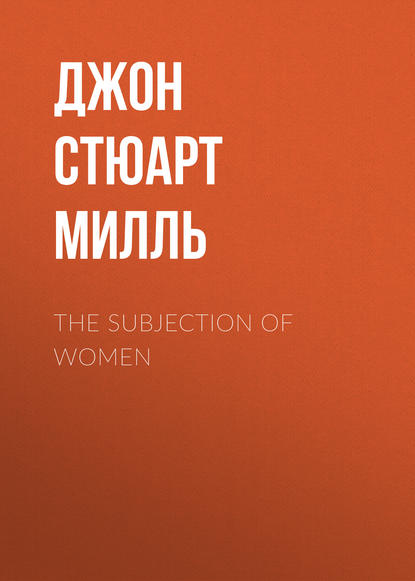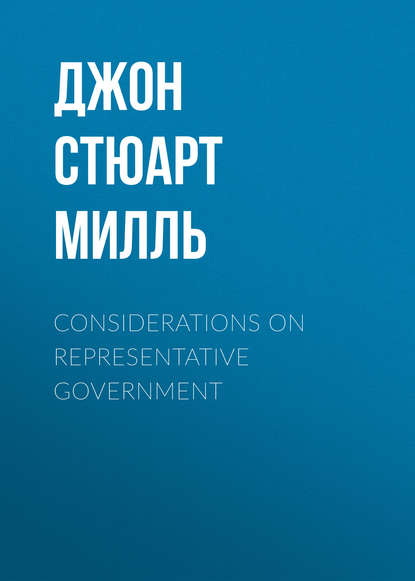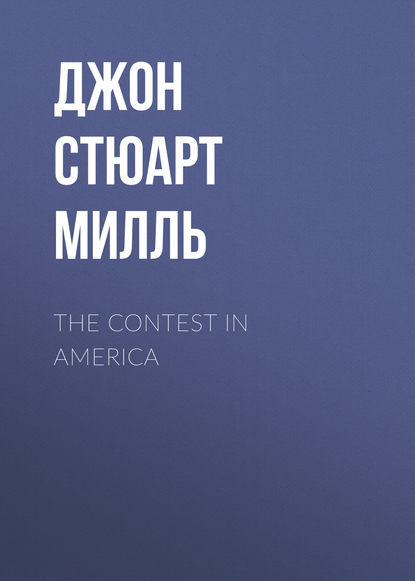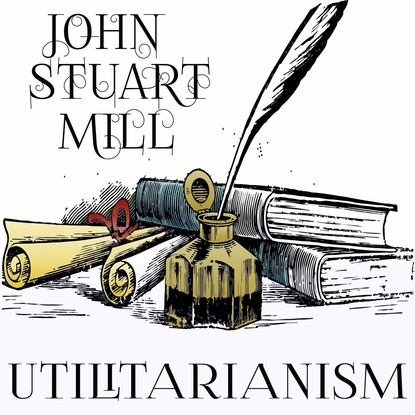 Полная версия
Полная версияПолная версия:
Джон Стюарт Милль The Subjection of Women
- + Увеличить шрифт
- - Уменьшить шрифт

John Stuart Mill
The Subjection of Women
CHAPTER I
The object of this Essay is to explain as clearly as I am able, the grounds of an opinion which I have held from the very earliest period when I had formed any opinions at all on social or political matters, and which, instead of being weakened or modified, has been constantly growing stronger by the progress of reflection and the experience of life: That the principle which regulates the existing social relations between the two sexes – the legal subordination of one sex to the other – is wrong in itself, and now one of the chief hindrances to human improvement; and that it ought to be replaced by a principle of perfect equality, admitting no power or privilege on the one side, nor disability on the other.
The very words necessary to express the task I have undertaken, show how arduous it is. But it would be a mistake to suppose that the difficulty of the case must lie in the insufficiency or obscurity of the grounds of reason on which my conviction rests. The difficulty is that which exists in all cases in which there is a mass of feeling to be contended against. So long as an opinion is strongly rooted in the feelings, it gains rather than loses in stability by having a preponderating weight of argument against it. For if it were accepted as a result of argument, the refutation of the argument might shake the solidity of the conviction; but when it rests solely on feeling, the worse it fares in argumentative contest, the more persuaded its adherents are that their feeling must have some deeper ground, which the arguments do not reach; and while the feeling remains, it is always throwing up fresh intrenchments of argument to repair any breach made in the old. And there are so many causes tending to make the feelings connected with this subject the most intense and most deeply-rooted of all those which gather round and protect old institutions and customs, that we need not wonder to find them as yet less undermined and loosened than any of the rest by the progress of the great modern spiritual and social transition; nor suppose that the barbarisms to which men cling longest must be less barbarisms than those which they earlier shake off.
In every respect the burthen is hard on those who attack an almost universal opinion. They must be very fortunate as well as unusually capable if they obtain a hearing at all. They have more difficulty in obtaining a trial, than any other litigants have in getting a verdict. If they do extort a hearing, they are subjected to a set of logical requirements totally different from those exacted from other people. In all other cases, the burthen of proof is supposed to lie with the affirmative. If a person is charged with a murder, it rests with those who accuse him to give proof of his guilt, not with himself to prove his innocence. If there is a difference of opinion about the reality of any alleged historical event, in which the feelings of men in general are not much interested, as the Siege of Troy for example, those who maintain that the event took place are expected to produce their proofs, before those who take the other side can be required to say anything; and at no time are these required to do more than show that the evidence produced by the others is of no value. Again, in practical matters, the burthen of proof is supposed to be with those who are against liberty; who contend for any restriction or prohibition; either any limitation of the general freedom of human action, or any disqualification or disparity of privilege affecting one person or kind of persons, as compared with others. The à priori presumption is in favour of freedom and impartiality. It is held that there should be no restraint not required by the general good, and that the law should be no respecter of persons, but should treat all alike, save where dissimilarity of treatment is required by positive reasons, either of justice or of policy. But of none of these rules of evidence will the benefit be allowed to those who maintain the opinion I profess. It is useless for me to say that those who maintain the doctrine that men have a right to command and women are under an obligation to obey, or that men are fit for government and women unfit, are on the affirmative side of the question, and that they are bound to show positive evidence for the assertions, or submit to their rejection. It is equally unavailing for me to say that those who deny to women any freedom or privilege rightly allowed to men, having the double presumption against them that they are opposing freedom and recommending partiality, must be held to the strictest proof of their case, and unless their success be such as to exclude all doubt, the judgment ought to go against them. These would be thought good pleas in any common case; but they will not be thought so in this instance. Before I could hope to make any impression, I should be expected not only to answer all that has ever been said by those who take the other side of the question, but to imagine all that could be said by them – to find them in reasons, as well as answer all I find: and besides refuting all arguments for the affirmative, I shall be called upon for invincible positive arguments to prove a negative. And even if I could do all this, and leave the opposite party with a host of unanswered arguments against them, and not a single unrefuted one on their side, I should be thought to have done little; for a cause supported on the one hand by universal usage, and on the other by so great a preponderance of popular sentiment, is supposed to have a presumption in its favour, superior to any conviction which an appeal to reason has power to produce in any intellects but those of a high class.
I do not mention these difficulties to complain of them; first, because it would be useless; they are inseparable from having to contend through people's understandings against the hostility of their feelings and practical tendencies: and truly the understandings of the majority of mankind would need to be much better cultivated than has ever yet been the case, before they can be asked to place such reliance in their own power of estimating arguments, as to give up practical principles in which they have been born and bred and which are the basis of much of the existing order of the world, at the first argumentative attack which they are not capable of logically resisting. I do not therefore quarrel with them for having too little faith in argument, but for having too much faith in custom and the general feeling. It is one of the characteristic prejudices of the reaction of the nineteenth century against the eighteenth, to accord to the unreasoning elements in human nature the infallibility which the eighteenth century is supposed to have ascribed to the reasoning elements. For the apotheosis of Reason we have substituted that of Instinct; and we call everything instinct which we find in ourselves and for which we cannot trace any rational foundation. This idolatry, infinitely more degrading than the other, and the most pernicious of the false worships of the present day, of all of which it is now the main support, will probably hold its ground until it gives way before a sound psychology, laying bare the real root of much that is bowed down to as the intention of Nature and the ordinance of God. As regards the present question, I am willing to accept the unfavourable conditions which the prejudice assigns to me. I consent that established custom, and the general feeling, should be deemed conclusive against me, unless that custom and feeling from age to age can be shown to have owed their existence to other causes than their soundness, and to have derived their power from the worse rather than the better parts of human nature. I am willing that judgment should go against me, unless I can show that my judge has been tampered with. The concession is not so great as it might appear; for to prove this, is by far the easiest portion of my task.
The generality of a practice is in some cases a strong presumption that it is, or at all events once was, conducive to laudable ends. This is the case, when the practice was first adopted, or afterwards kept up, as a means to such ends, and was grounded on experience of the mode in which they could be most effectually attained. If the authority of men over women, when first established, had been the result of a conscientious comparison between different modes of constituting the government of society; if, after trying various other modes of social organization – the government of women over men, equality between the two, and such mixed and divided modes of government as might be invented – it had been decided, on the testimony of experience, that the mode in which women are wholly under the rule of men, having no share at all in public concerns, and each in private being under the legal obligation of obedience to the man with whom she has associated her destiny, was the arrangement most conducive to the happiness and well being of both; its general adoption might then be fairly thought to be some evidence that, at the time when it was adopted, if was the best: though even then the considerations which recommended it may, like so many other primeval social facts of the greatest importance, have subsequently, in the course of ages, ceased to exist. But the state of the case is in every respect the reverse of this. In the first place, the opinion in favour of the present system, which entirely subordinates the weaker sex to the stronger, rests upon theory only; for there never has been trial made of any other: so that experience, in the sense in which it is vulgarly opposed to theory, cannot be pretended to have pronounced any verdict. And in the second place, the adoption of this system of inequality never was the result of deliberation, or forethought, or any social ideas, or any notion whatever of what conduced to the benefit of humanity or the good order of society. It arose simply from the fact that from the very earliest twilight of human society, every woman (owing to the value attached to her by men, combined with her inferiority in muscular strength) was found in a state of bondage to some man. Laws and systems of polity always begin by recognising the relations they find already existing between individuals. They convert what was a mere physical fact into a legal right, give it the sanction of society, and principally aim at the substitution of public and organized means of asserting and protecting these rights, instead of the irregular and lawless conflict of physical strength. Those who had already been compelled to obedience became in this manner legally bound to it. Slavery, from being a mere affair of force between the master and the slave, became regularized and a matter of compact among the masters, who, binding themselves to one another for common protection, guaranteed by their collective strength the private possessions of each, including his slaves. In early times, the great majority of the male sex were slaves, as well as the whole of the female. And many ages elapsed, some of them ages of high cultivation, before any thinker was bold enough to question the rightfulness, and the absolute social necessity, either of the one slavery or of the other. By degrees such thinkers did arise: and (the general progress of society assisting) the slavery of the male sex has, in all the countries of Christian Europe at least (though, in one of them, only within the last few years) been at length abolished, and that of the female sex has been gradually changed into a milder form of dependence. But this dependence, as it exists at present, is not an original institution, taking a fresh start from considerations of justice and social expediency – it is the primitive state of slavery lasting on, through successive mitigations and modifications occasioned by the same causes which have softened the general manners, and brought all human relations more under the control of justice and the influence of humanity. It has not lost the taint of its brutal origin. No presumption in its favour, therefore, can be drawn from the fact of its existence. The only such presumption which it could be supposed to have, must be grounded on its having lasted till now, when so many other things which came down from the same odious source have been done away with. And this, indeed, is what makes it strange to ordinary ears, to hear it asserted that the inequality of rights between men and women has no other source than the law of the strongest.
That this statement should have the effect of a paradox, is in some respects creditable to the progress of civilization, and the improvement of the moral sentiments of mankind. We now live – that is to say, one or two of the most advanced nations of the world now live – in a state in which the law of the strongest seems to be entirely abandoned as the regulating principle of the world's affairs: nobody professes it, and, as regards most of the relations between human beings, nobody is permitted to practise it. When any one succeeds in doing so, it is under cover of some pretext which gives him the semblance of having some general social interest on his side. This being the ostensible state of things, people flatter themselves that the rule of mere force is ended; that the law of the strongest cannot be the reason of existence of anything which has remained in full operation down to the present time. However any of our present institutions may have begun, it can only, they think, have been preserved to this period of advanced civilization by a well-grounded feeling of its adaptation to human nature, and conduciveness to the general good. They do not understand the great vitality and durability of institutions which place right on the side of might; how intensely they are clung to; how the good as well as the bad propensities and sentiments of those who have power in their hands, become identified with retaining it; how slowly these bad institutions give way, one at a time, the weakest first, beginning with those which are least interwoven with the daily habits of life; and how very rarely those who have obtained legal power because they first had physical, have ever lost their hold of it until the physical power had passed over to the other side. Such shifting of the physical force not having taken place in the case of women; this fact, combined with all the peculiar and characteristic features of the particular case, made it certain from the first that this branch of the system of right founded on might, though softened in its most atrocious features at an earlier period than several of the others, would be the very last to disappear. It was inevitable that this one case of a social relation grounded on force, would survive through generations of institutions grounded on equal justice, an almost solitary exception to the general character of their laws and customs; but which, so long as it does not proclaim its own origin, and as discussion has not brought out its true character, is not felt to jar with modern civilization, any more than domestic slavery among the Greeks jarred with their notion of themselves as a free people.
The truth is, that people of the present and the last two or three generations have lost all practical sense of the primitive condition of humanity; and only the few who have studied history accurately, or have much frequented the parts of the world occupied by the living representatives of ages long past, are able to form any mental picture of what society then was. People are not aware how entirely, in former ages, the law of superior strength was the rule of life; how publicly and openly it was avowed, I do not say cynically or shamelessly – for these words imply a feeling that there was something in it to be ashamed of, and no such notion could find a place in the faculties of any person in those ages, except a philosopher or a saint. History gives a cruel experience of human nature, in shewing how exactly the regard due to the life, possessions, and entire earthly happiness of any class of persons, was measured by what they had the power of enforcing; how all who made any resistance to authorities that had arms in their hands, however dreadful might be the provocation, had not only the law of force but all other laws, and all the notions of social obligation against them; and in the eyes of those whom they resisted, were not only guilty of crime, but of the worst of all crimes, deserving the most cruel chastisement which human beings could inflict. The first small vestige of a feeling of obligation in a superior to acknowledge any right in inferiors, began when he had been induced, for convenience, to make some promise to them. Though these promises, even when sanctioned by the most solemn oaths, were for many ages revoked or violated on the most trifling provocation or temptation, it is probable that this, except by persons of still worse than the average morality, was seldom done without some twinges of conscience. The ancient republics, being mostly grounded from the first upon some kind of mutual compact, or at any rate formed by an union of persons not very unequal in strength, afforded, in consequence, the first instance of a portion of human relations fenced round, and placed under the dominion of another law than that of force. And though the original law of force remained in full operation between them and their slaves, and also (except so far as limited by express compact) between a commonwealth and its subjects, or other independent commonwealths; the banishment of that primitive law even from so narrow a field, commenced the regeneration of human nature, by giving birth to sentiments of which experience soon demonstrated the immense value even for material interests, and which thenceforward only required to be enlarged, not created. Though slaves were no part of the commonwealth, it was in the free states that slaves were first felt to have rights as human beings. The Stoics were, I believe, the first (except so far as the Jewish law constitutes an exception) who taught as a part of morality that men were bound by moral obligations to their slaves. No one, after Christianity became ascendant, could ever again have been a stranger to this belief, in theory; nor, after the rise of the Catholic Church, was it ever without persons to stand up for it. Yet to enforce it was the most arduous task which Christianity ever had to perform. For more than a thousand years the Church kept up the contest, with hardly any perceptible success. It was not for want of power over men's minds. Its power was prodigious. It could make kings and nobles resign their most valued possessions to enrich the Church. It could make thousands, in the prime of life and the height of worldly advantages, shut themselves up in convents to work out their salvation by poverty, fasting, and prayer. It could send hundreds of thousands across land and sea, Europe and Asia, to give their lives for the deliverance of the Holy Sepulchre. It could make kings relinquish wives who were the object of their passionate attachment, because the Church declared that they were within the seventh (by our calculation the fourteenth) degree of relationship. All this it did; but it could not make men fight less with one another, nor tyrannize less cruelly over the serfs, and when they were able, over burgesses. It could not make them renounce either of the applications of force; force militant, or force triumphant. This they could never be induced to do until they were themselves in their turn compelled by superior force. Only by the growing power of kings was an end put to fighting except between kings, or competitors for kingship; only by the growth of a wealthy and warlike bourgeoisie in the fortified towns, and of a plebeian infantry which proved more powerful in the field than the undisciplined chivalry, was the insolent tyranny of the nobles over the bourgeoisie and peasantry brought within some bounds. It was persisted in not only until, but long after, the oppressed had obtained a power enabling them often to take conspicuous vengeance; and on the Continent much of it continued to the time of the French Revolution, though in England the earlier and better organization of the democratic classes put an end to it sooner, by establishing equal laws and free national institutions.
If people are mostly so little aware how completely, during the greater part of the duration of our species, the law of force was the avowed rule of general conduct, any other being only a special and exceptional consequence of peculiar ties – and from how very recent a date it is that the affairs of society in general have been even pretended to be regulated according to any moral law; as little do people remember or consider, how institutions and customs which never had any ground but the law of force, last on into ages and states of general opinion which never would have permitted their first establishment. Less than forty years ago, Englishmen might still by law hold human beings in bondage as saleable property: within the present century they might kidnap them and carry them off, and work them literally to death. This absolutely extreme case of the law of force, condemned by those who can tolerate almost every other form of arbitrary power, and which, of all others, presents features the most revolting to the feelings of all who look at it from an impartial position, was the law of civilized and Christian England within the memory of persons now living: and in one half of Anglo-Saxon America three or four years ago, not only did slavery exist, but the slave trade, and the breeding of slaves expressly for it, was a general practice between slave states. Yet not only was there a greater strength of sentiment against it, but, in England at least, a less amount either of feeling or of interest in favour of it, than of any other of the customary abuses of force: for its motive was the love of gain, unmixed and undisguised; and those who profited by it were a very small numerical fraction of the country, while the natural feeling of all who were not personally interested in it, was unmitigated abhorrence. So extreme an instance makes it almost superfluous to refer to any other: but consider the long duration of absolute monarchy. In England at present it is the almost universal conviction that military despotism is a case of the law of force, having no other origin or justification. Yet in all the great nations of Europe except England it either still exists, or has only just ceased to exist, and has even now a strong party favourable to it in all ranks of the people, especially among persons of station and consequence. Such is the power of an established system, even when far from universal; when not only in almost every period of history there have been great and well-known examples of the contrary system, but these have almost invariably been afforded by the most illustrious and most prosperous communities. In this case, too, the possessor of the undue power, the person directly interested in it, is only one person, while those who are subject to it and suffer from it are literally all the rest. The yoke is naturally and necessarily humiliating to all persons, except the one who is on the throne, together with, at most, the one who expects to succeed to it. How different are these cases from that of the power of men over women! I am not now prejudging the question of its justifiableness. I am showing how vastly more permanent it could not but be, even if not justifiable, than these other dominations which have nevertheless lasted down to our own time. Whatever gratification of pride there is in the possession of power, and whatever personal interest in its exercise, is in this case not confined to a limited class, but common to the whole male sex. Instead of being, to most of its supporters, a thing desirable chiefly in the abstract, or, like the political ends usually contended for by factious, of little private importance to any but the leaders; it comes home to the person and hearth of every male head of a family, and of every one who looks forward to being so. The clodhopper exercises, or is to exercise, his share of the power equally with the highest nobleman. And the case is that in which the desire of power is the strongest: for every one who desires power, desires it most over those who are nearest to him, with whom his life is passed, with whom he has most concerns in common, and in whom any independence of his authority is oftenest likely to interfere with his individual preferences. If, in the other cases specified, powers manifestly grounded only on force, and having so much less to support them, are so slowly and with so much difficulty got rid of, much more must it be so with this, even if it rests on no better foundation than those. We must consider, too, that the possessors of the power have facilities in this case, greater than in any other, to prevent any uprising against it. Every one of the subjects lives under the very eye, and almost, it may be said, in the hands, of one of the masters – in closer intimacy with him than with any of her fellow-subjects; with no means of combining against him, no power of even locally over-mastering him, and, on the other hand, with the strongest motives for seeking his favour and avoiding to give him offence. In struggles for political emancipation, everybody knows how often its champions are bought off by bribes, or daunted by terrors. In the case of women, each individual of the subject-class is in a chronic state of bribery and intimidation combined. In setting up the standard of resistance, a large number of the leaders, and still more of the followers, must make an almost complete sacrifice of the pleasures or the alleviations of their own individual lot. If ever any system of privilege and enforced subjection had its yoke tightly riveted on the necks of those who are kept down by it, this has. I have not yet shown that it is a wrong system: but every one who is capable of thinking on the subject must see that even if it is, it was certain to outlast all other forms of unjust authority. And when some of the grossest of the other forms still exist in many civilized countries, and have only recently been got rid of in others, it would be strange if that which is so much the deepest-rooted had yet been perceptibly shaken anywhere. There is more reason to wonder that the protests and testimonies against it should have been so numerous and so weighty as they are.





